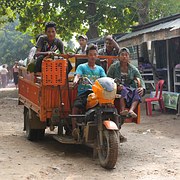 by Hnin Yadana Zaw and Soe Zeya Tun.
by Hnin Yadana Zaw and Soe Zeya Tun.
When a boat stacked with gravel moors at a jetty in Yangon, 14-year-old Aung Htet Myat fills a basket he then carries on his back to trucks that whisk the load to construction sites springing up across Myanmar’s booming biggest city.
For each basket a labor broker rewards the boy with a stick he puts in a plastic bottle tied to his belt. At the end of the shift, which at the busiest times can last up to 24 hours, he exchanges the sticks for cash – 100 baskets earns him about $2.50.
“I carry baskets with stones the whole day,” said Aung Htet Myat, who has worked at the jetty for the last two years. “If there is no gravel boat to unload, I help bus drivers as an assistant.”
One-in-five children in Myanmar aged 10-17 go to work instead of school, according to figures from a census report on employment published last month, and the opening up of the economy since 2011 has triggered a spike on demand for labor.
As the former Burma emerges from nearly 50 years of neglect under military rule, Yangon has been transformed into a vast construction site.
Than Than Win and her two teenage sons began working at the same jetty as Aung Htet Myat after her husband died. The family now rely on a labor broker who lends her money in return for on-demand, non-stop work when a boat arrives.
“He gives us a place to stay and we can also take money from him when we have no job,” said Than Than Win, as nearby her sons carried another load of gravel on their backs. “We have no way to pay it back, so whenever he asks us to work we can’t refuse.”
Her story is common in Yangon’s slums, filled with people who have flocked from the countryside as the economy has boomed, says Michael Slingsby, an urban poverty expert based in the city.
“People borrow money from lenders and in order to repay their debts children are being sent out to work,” he said.
May Win Myint, a senior member of Aung San Suu Kyi’s National League for Democracy (NLD) which took power this month, said tackling child labor was one of the party’s goals.
“If we cannot solve this problem, there will not be any development in our country because they will be the people serving the country in the future,” she said. “They need to be educated to do that.”
 To do that the first freely elected government since the early 1960s will need to address labor laws that experts say are fragmented and rarely enforced.
To do that the first freely elected government since the early 1960s will need to address labor laws that experts say are fragmented and rarely enforced.
Find the whole article and a related video here.
Tip: More up to date educational events can be found online on the Education Database »medicine & health«.
